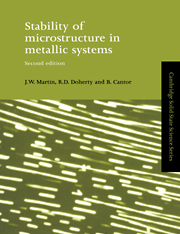Book contents
- Frontmatter
- Contents
- Preface to first edition
- Preface to second edition
- Chapter 1 The general problem of the stability of microstructure
- Chapter 2 Structural instability due to chemical free energy
- Chapter 3 Highly metastable alloys
- Chapter 4 Instability due to strain energy
- Chapter 5 Microstructural instability due to interfaces
- Chapter 6 Other causes of microstructural instability
- References
- Index
Preface to first edition
Published online by Cambridge University Press: 18 December 2009
- Frontmatter
- Contents
- Preface to first edition
- Preface to second edition
- Chapter 1 The general problem of the stability of microstructure
- Chapter 2 Structural instability due to chemical free energy
- Chapter 3 Highly metastable alloys
- Chapter 4 Instability due to strain energy
- Chapter 5 Microstructural instability due to interfaces
- Chapter 6 Other causes of microstructural instability
- References
- Index
Summary
Man's use of materials, both as a craft and more recently as a science, depends on his ability to produce a particular microstructure with desirable properties in the material when it has been fabricated into a useful object. Such a microstructure occurs, for example, in a steel crankshaft heat-treated for maximum strength, a glass lens heat-treated for fracture resistance or a small crystal of silicon containing non-uniform distributions of solute acting as a complex electronic circuit. Such microstructures are almost always thermodynamically unstable. This situation arises since for any alloy there is only one completely stable structure and there is an infinite number of possible unstable microstructures. The one with the best properties is therefore almost always one of the unstable ones. The desired structure is usually produced by some combination of heat-treatment, solute diffusion and deformation, in the course of which the transformation is arrested, normally by cooling to room temperature, at the right time to obtain the optimum structure. The success of these processes, many of which were derived from craft skills, to give materials with good strength, toughness, electrical properties, etc., is an essential part of current technology. There is, however, a price to be paid in that all these structures are potentially unstable, so that the structures can, and frequently do, transform with time into less desirable forms, especially if used at elevated temperatures.
- Type
- Chapter
- Information
- Stability of Microstructure in Metallic Systems , pp. xiii - xivPublisher: Cambridge University PressPrint publication year: 1997

